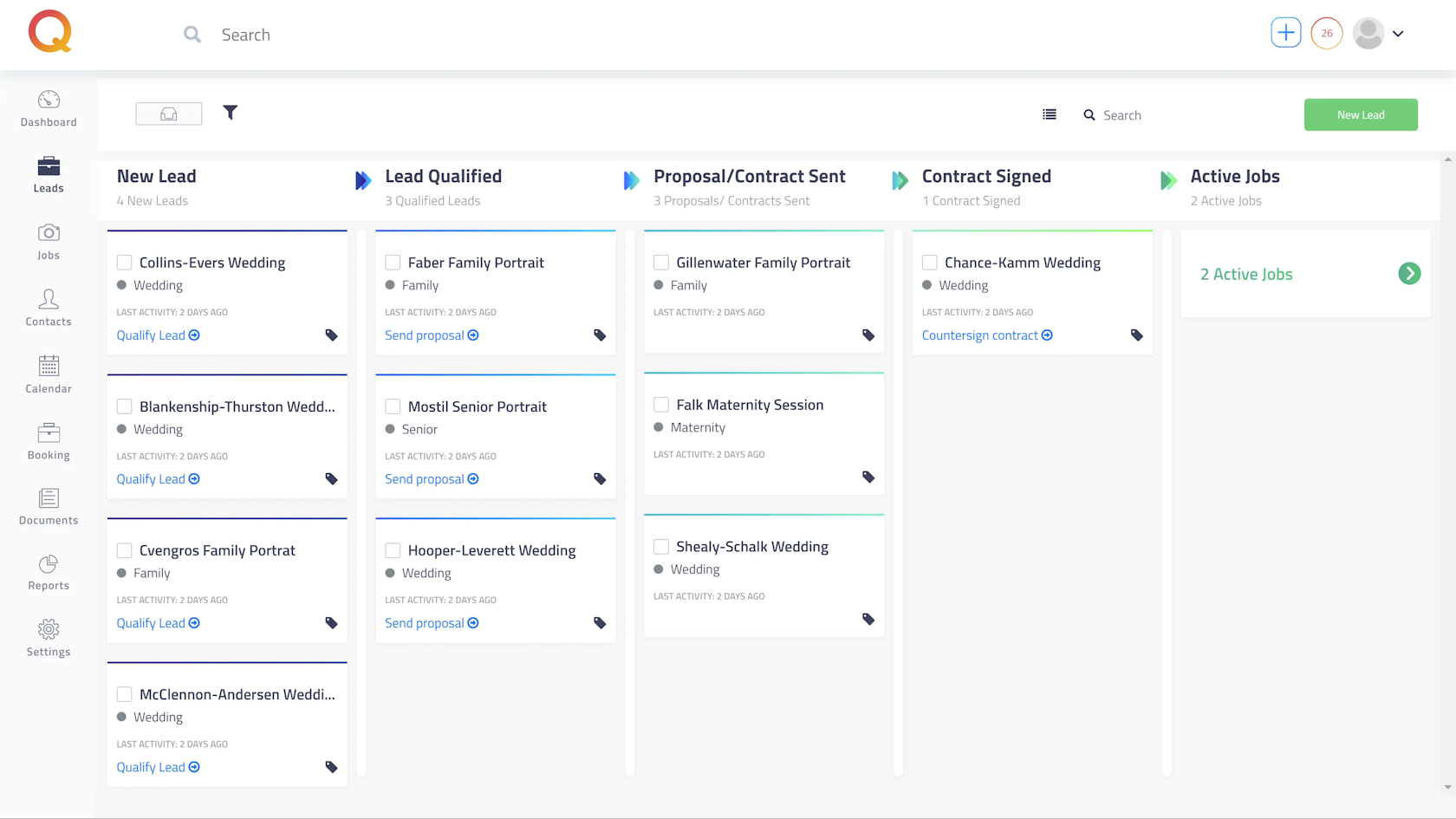
What is the Future of CRM (Customer Relationship Management) in 2023 and Beyond
A CRM system is software that allows companies to store information about customers and interactions with each of them. This system collects data in one place, thanks to which leads don’t disappear: the manager receives tasks to work with buyers and does not forget about them. This type of software has been in great demand over the past 20+ years, constantly changing and expanding with new features. But what about the future of customer relationship management? Below, we will talk about the best latest trends in CRM.
What Is a Customer Relationship Management System?
CRM systems store various information about customers: name, contacts, history of purchases, and calls to the company, as well as the history of participation in promotions. Thanks to this data, businesses can drive sales growth, improve the effectiveness of marketing campaigns, and introduce new technologies for communicating with customers.
CRM Systems and Workflow Optimization
With the help of a CRM system, companies solve sales problems, increase the productivity of employees, and regularly monitor important financial indicators.
According to EPCGroup's analytics, CRMs exploded in 2022, achieving an 11.6% CAGR from 2022 to 2027. Doesn't this provide an excellent foundation for continuous improvement and optimization of this kind of software? In fact, it does. Below, we propose the most advanced future trends in CRM that turn ordinary software into a real Holy Grail for business.
12 CRM Trends to Consider in 2023
So what is the future of CRM, and what are the trends that make the CRM system cutting edge? Let's figure it out. You can also learn how to build a CRM if you need more information about the development process.
End-to-end automation
Although the original concept of CRM systems implies automation, in 2023 this feature promises to be even more comprehensive and advanced than ever before. In particular, in recent years, CRMs have been in great demand, allowing companies to automate tasks for which they were not previously responsible, such as updating customer data, sharing documents, sending notifications to customers, etc. Thanks to this, the customer support teams get the opportunity to focus their efforts on other, more essential tasks and not waste time on routine work.
Combining sales, marketing, and operations
Modern CRM is not only used for direct interaction with customers. Today, this technology must cover a much wider range of tasks, including marketing and sales operations. Thus, such CRMs contribute to the universalization of the company's employees, making them multitasking specialists who can cope with everything related to interaction, direct and indirect, with customers.
In terms of business benefits that are achievable even in the short term, this merging of separate functions allows for a more consistent and smooth process for customers to move toward a purchase, reducing the likelihood that they will not reach the final stages of the sales funnel.
Customer-oriented approach
With access to customer data, companies today can get deeper insights into their behavior and needs than ever before. Thanks to this, they get the opportunity to retain old customers and not spend huge financial resources on attracting new ones.
In particular, such an assist in the collection, analysis, and use of data can be achieved with a CRM system that embodies a custom-oriented approach. The functionality of such software solutions goes far beyond the creation of traditional ‘forced’ loyalty programs and simple promotions. Instead, they allow companies to tailor marketing to a specific customer and increase their engagement level by considering their personal pain points and goals.
Personalization based on relevant data
Unlike independent analysis of data about customers, which is a necessity for the implementation of the previous trend, developing personalized marketing strategies involves considering the data that customers directly or indirectly indicate about themselves. In particular, many modern CRM systems automatically check the previous purchase history of customers and can create samples of goods or services that will be of interest to a specific customer in the future. This approach, because of automation, allows companies to perform the task of personalization more efficiently in the context of spending time and resources. As for the customers, they receive a service that is ‘tailored’ to their interests and needs.
Self-service integration
Modern customers want to resort to the help of company employees less often and solve their problems on their own. There is an increasing need to expand the range of tasks that can be transformed into self-service. In particular, customers expect that they will have access to knowledge bases, user forums, and other information resources that will help them solve their problems without outside help. Therefore, a trending CRM system should take into account these needs and satisfy them (for example, through chatbots, customer portals, etc.).
Introduction of advanced technologies
While the vast majority of business software has already been able to benefit from artificial intelligence, machine learning, voice search, and other trending concepts, it would be surprising if this opportunity bypassed CRM platforms. In particular, artificial intelligence can be used for an in-depth analysis of customer behavior and thus provide a more accurate understanding of what they desire.
Mobile experience
Even though the first mobile CRM was launched in the late 90s, nowadays, mobility is no longer a pleasant bonus to the main desktop solutions: mobile CRMs can completely replace them. As for trends, in the coming years, it is expected that mobile CRMs will enter the market not only from world-famous digital giants but also from small providers that are focused specifically on creating solutions based on the mobile-first approach. In general, the relevance of this trend has taken on new dimensions since the beginning of the COVID-19 pandemic, when companies had to switch to a remote or hybrid format for interacting with their employees.
Social media integration
Because of the unceasing popularity of social networks and their use by customers to publish their reviews about products and services, modern CRMs just cannot refuse features that would process this feedback for the benefit of the business or, in addition, analyze customer data for further personalization of services. That is why many advanced CRMs integrate with social networks such as Facebook, Twitter, Instagram, and LinkedIn through APIs.
Focus on KPIs
KPIs (key performance indicators) are often calculated autonomously by companies because they require data collection from several disparate sources. However, with the increased flexibility of CRMs, manual calculations are no longer a problem. Thanks to the support of an extensive number of integrations, data from a CRM can be uploaded to analytical software in a matter of moments for further processing and comparison with data received from other applications used by the company.
Exception handling
If earlier exceptional situations required manual intervention by the support staff, today, these problems can be partially solved with the help of an advanced CRM. In particular, highly intelligent chatbots can come to the rescue, which, with the help of artificial intelligence, can process even the most specific customer requests independently.
Customer value analysis
It is now known that each customer has a lifetime value for each business, that is, the ratio between the resources spent on attracting and retaining them and the profit received from the purchases they made. Modern CRMs can automatically calculate this value and, based on it, generate special offers for VIP clients.
Channel-less CRMs
Unlike omnichannel CRMs, which provide communication with customers across all existing communication channels, channel-less ones shift the focus to a personalized approach to each individual customer. These days, people care less about how they will be contacted by company employees and want to get a solution to their problem as soon as possible, no matter what it costs the company itself. Typically, detailed software solutions use advanced technologies (for example, IoT) to anticipate the interactions that are most convenient for a particular customer.
Gearheart is a Team of Real Professionals in the Development of CRM Solutions or Similar
Gearheart is a Ukrainian software development company that specializes in creating scalable custom solutions. Our main focus is to ensure longevity even for small projects, creating optimal conditions for their further rework and upgrades. We provide a full range of services related to the implementation of the software life cycle, including MVP development services, programming of a full-scale solution, testing, development process management, server configuration, support, and handling documentation. To implement advanced concepts such as AI/VR/AR/ML, we involve third-party experts who specialize in these technologies.
Below, we invite you to consider a particular case of CRM development that we successfully completed. Also, if you want to create a convenient CRM system that will benefit your business, check out our article about how to create data visualization software.
Photography management CRM software

The founders of ShootQ approached us to update a custom CRM system with advanced functionality adapted for photographers. The turnkey solution has been on the market for about a decade and has allowed its users to track clients, schedule photo shoots, monitor order completion, advertise photo studio services, and create email marketing templates.
However, the design of this CRM system was outdated, so we set about developing a more modern analog that would be relevant for solving actual business problems.
When our team received a request to update the app, the design and backend were already underway. Thus, our main task was to develop the front end, including the application interface, but over time we took over the entire project.
As a result, the previous functionality was extended by such features as automated online booking, lead tracking, tools for filtering and sorting tasks, built-in online payments, a module for creating seminars, as well as a new package of templates for emails, business offers, questionnaires, invoices, contracts, etc.
The ShootQ update was completed by the end of 2019. Currently, ShootQ has a good user rating and over a thousand positive reviews, and this application is used by many world-famous photographers.
If you would like to implement a similar solution based on new trends in CRM, please, write to us.
Conclusion
As we can see, CRM in the future will move towards end-to-end automation and enrichment with advanced tech solutions. If you want to implement the above future CRM trends in your custom solution or have your own unique requirements for the implementation of your project, feel free to contact us.
FAQ
And now, to summarize the above, let's answer the most frequently asked questions relevant to the future of CRM.
What is the future of CRM?
If we talk about the future of CRM, due to the growing expectations of consumers, CRM systems will become more popular and versatile, allowing companies to cover an increasing number of tasks directly or indirectly related to interaction with customers. This is supported by statistics: CRMs exploded in 2022, achieving an 11.6% CAGR from 2022 to 2027.
What are the main future CRM trends?
Here are twelve main trends in customer relationship management:
- end-to-end automation;
- combining sales, marketing, and operations;
- customer-oriented approach;
- personalization based on relevant customer data;
- self-service-integration;
- introduction of advanced technologies;
- mobile experience;
- social media integration;
- focus on KPIs;
- exception handling;
- customer value analysis;
- channel-less CRMs.
How do I build a CRM enriched with the trendiest technologies?
To create a custom solution, you will need to find a reliable software development provider who has experience in creating such solutions. We offer services for the development of custom CRM, so if your business idea requires the participation of high-class IT specialists with their own CRM future vision, please, contact us.



